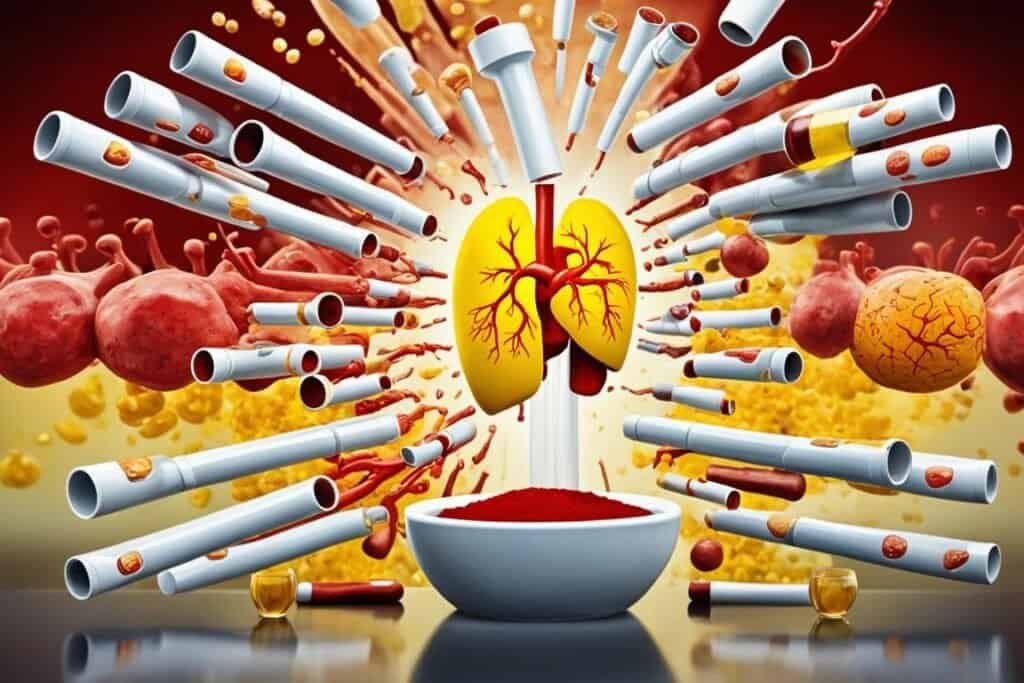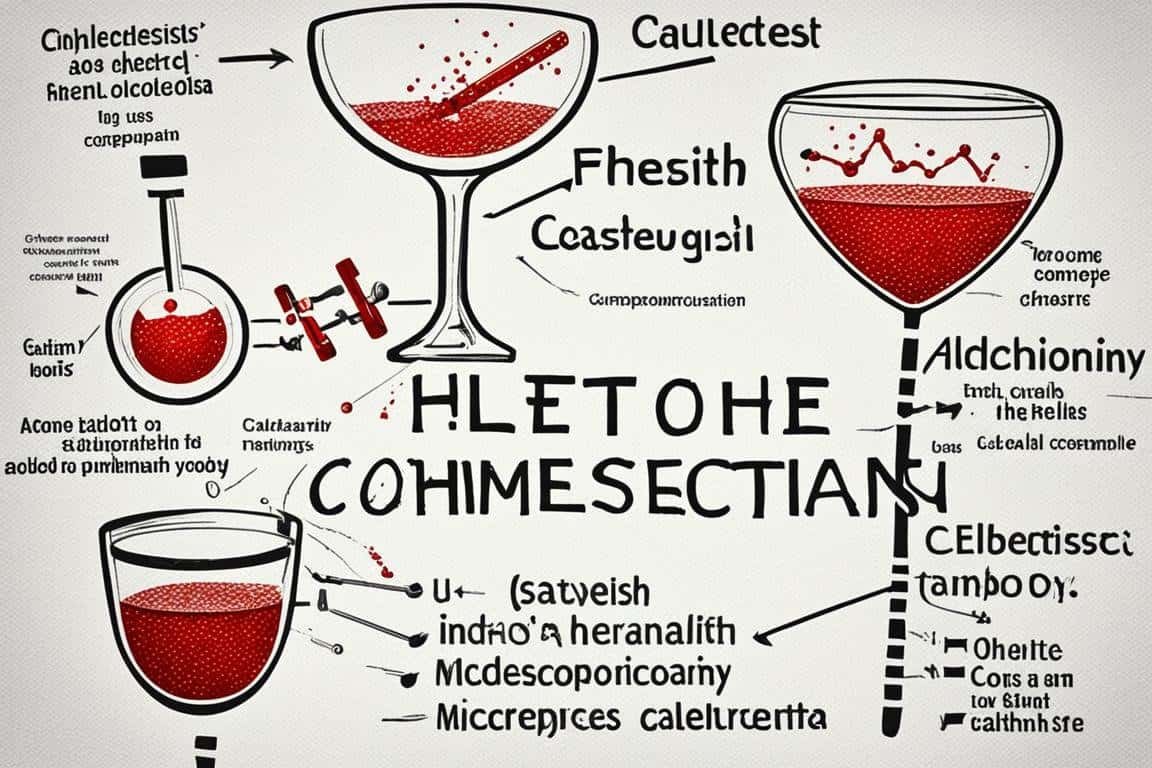Did you know that your alcohol consumption can have an impact on your cholesterol levels? Many studies have found that moderate alcohol intake may have some heart-healthy benefits, but excessive drinking can increase the risk of heart disease and other health problems.
When it comes to alcohol and cholesterol, moderation is key. While light to moderate alcohol consumption has been associated with increased levels of HDL (good) cholesterol, heavy drinking can lead to elevated levels of LDL (bad) cholesterol, total cholesterol, and triglycerides.
It’s important to note that the effects of alcohol on cholesterol levels can vary among individuals, and women may be more sensitive to these effects than men. Additionally, the American Heart Association does not recommend drinking alcohol specifically to lower cholesterol or improve heart health.
Key Takeaways:
- Moderate alcohol consumption may offer heart-healthy benefits, such as increasing HDL cholesterol levels.
- Excessive alcohol consumption can lead to elevated levels of LDL cholesterol, total cholesterol, and triglycerides.
- The effects of alcohol on cholesterol levels vary among individuals, and women may be more sensitive to these effects.
- Consult with a healthcare professional before consuming alcohol, especially if you are pregnant or taking certain medications.
- It is recommended to drink alcohol in moderation, within the recommended limits.
The Effects of Alcohol on Cholesterol Levels
The relationship between alcohol and cholesterol levels is complex and depends on the amount and frequency of alcohol consumption. Light to moderate alcohol intake has been associated with increased levels of HDL (good) cholesterol, which helps protect against heart disease by removing excess cholesterol from the arteries. On the other hand, heavy alcohol consumption can lead to elevated levels of LDL (bad) cholesterol, total cholesterol, and triglycerides, as well as increased blood pressure. It is important to note that the effects of alcohol on cholesterol levels vary among individuals, and women may be more sensitive to the effects of alcohol compared to men.
To better understand the impact of alcohol on cholesterol, let’s take a closer look at how it affects different types of cholesterol:
| Alcohol Consumption | Effect on Cholesterol Levels |
|---|---|
| Light to moderate intake | Increased levels of HDL cholesterol (the good cholesterol) |
| Heavy consumption | Elevated levels of LDL cholesterol (the bad cholesterol), total cholesterol, and triglycerides |
It’s important to keep in mind that these effects can vary depending on the individual and their overall health. Women, in particular, may experience a more pronounced impact on cholesterol levels compared to men. Therefore, it is crucial to drink alcohol in moderation and consult with a healthcare professional to determine what is appropriate for your specific situation.
Drinking Habits and Cholesterol Levels
How often and how much you drink can have an impact on your cholesterol levels. Light to moderate alcohol consumption, within the recommended limits, is unlikely to negatively affect your cholesterol levels and may even improve the levels of HDL cholesterol, also known as “good” cholesterol. On the other hand, excessive drinking can impair your heart health and lead to higher levels of total cholesterol and triglycerides.
It is recommended to drink alcohol in moderation to maintain a healthy balance. For women, this means consuming up to one drink per day, while for men, it is recommended to consume up to two drinks per day. By cutting back on alcohol consumption, even if you fall into the heavy drinking category, you can significantly reduce your risk of heart disease.

Alcohol and Maintaining Healthy Cholesterol Levels
When it comes to alcohol consumption and cholesterol levels, moderation is key. For most people, light to moderate alcohol intake is unlikely to have a negative impact on cholesterol levels. In fact, it may even have some benefits for maintaining healthy cholesterol levels and reducing the risk of heart disease.
Research has shown that moderate alcohol consumption can increase levels of high-density lipoprotein (HDL) cholesterol, commonly known as the “good” cholesterol. HDL cholesterol helps remove excess cholesterol from the bloodstream, protecting against the buildup of plaque in the arteries.
However, it’s important to note that heavy alcohol consumption can have the opposite effect. Excessive drinking can impair heart health and lead to elevated levels of total cholesterol and triglycerides, as well as increased blood pressure.
To maintain healthy cholesterol levels, it is essential to limit alcohol intake and adopt a balanced lifestyle. Regular exercise, a nutritious diet, and maintaining a healthy weight can all contribute to maintaining optimal cholesterol levels.
It’s also crucial to monitor cholesterol levels regularly through medical exams. This allows you to track any changes and address any concerns promptly. If you have questions or concerns about alcohol consumption and its impact on your cholesterol levels, consult with a healthcare professional who can provide personalized guidance.

| Light to Moderate Alcohol Consumption | Heavy Alcohol Consumption | |
|---|---|---|
| HDL Cholesterol | Increase | May decrease |
| Total Cholesterol | No significant effect | May increase |
| Triglycerides | No significant effect | May increase |
| Blood Pressure | No significant effect | May increase |
Note: Individual responses to alcohol can vary, and women may be more sensitive to its effects on cholesterol levels compared to men.
Drinking Alcohol Responsibly
When it comes to alcohol consumption, responsible drinking is key to maintaining a healthy relationship between alcohol and cholesterol levels. By staying within the recommended limits, you can minimize potential risks to your cholesterol and overall health.
The current guidelines suggest that women should consume no more than one drink per day, while men should limit their intake to two drinks per day. It’s important to note that these recommendations may vary for individuals with specific health conditions or those taking certain medications.
Binge drinking, defined as consuming multiple drinks within a short period, can significantly increase the risk of heart disease and other health problems. It’s crucial to be mindful of your alcohol intake and avoid excessive drinking.
Remember, responsible alcohol consumption not only helps maintain healthy cholesterol levels but also promotes overall well-being. If you have concerns about your alcohol use or cholesterol levels, it’s always a good idea to seek guidance from a healthcare professional.
By adopting responsible drinking habits, you can enjoy alcohol while minimizing the potential impact on your cholesterol and overall health.
Conclusion
In conclusion, the relationship between alcohol and cholesterol levels is complex and dependent on several factors, including the amount and frequency of alcohol consumption. Light to moderate alcohol intake, within recommended limits, may have some heart-healthy benefits, such as increasing HDL cholesterol levels and reducing the risk of heart disease. However, heavy drinking can impair heart health and raise total cholesterol and triglyceride levels.
It is important to monitor your cholesterol levels regularly to understand how alcohol consumption may be affecting your cardiovascular health. Maintaining a healthy lifestyle, including regular exercise, a balanced diet, and weight management, is crucial for overall well-being and managing cholesterol levels.
If you have concerns about alcohol consumption or cholesterol levels, it is advisable to seek guidance from a healthcare professional. They can provide personalized advice and support to help you make informed decisions about your alcohol intake and cholesterol management.

